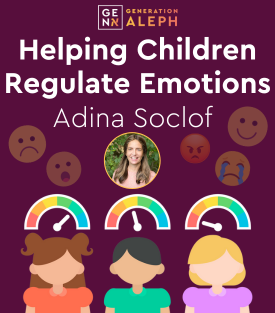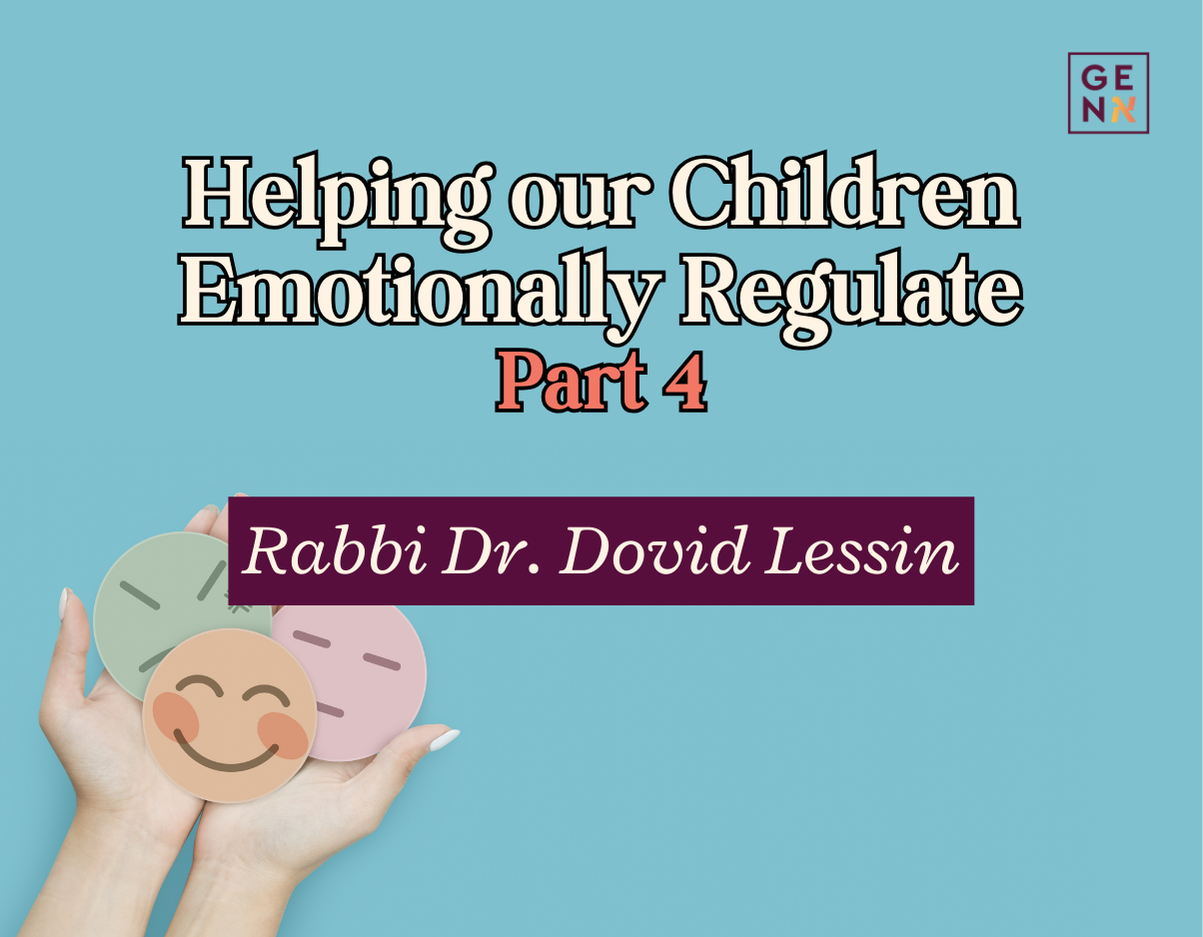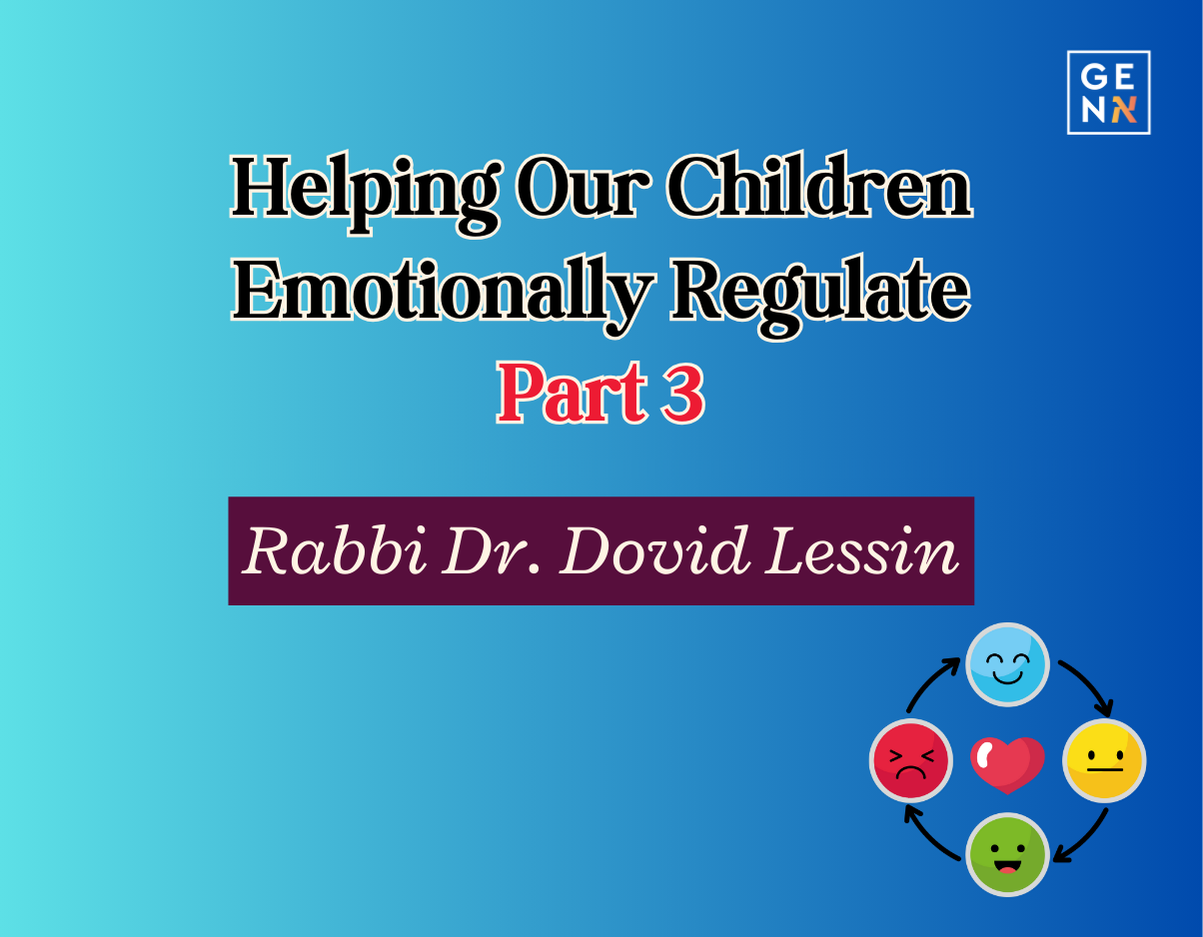At last year’s Agudath Israel of America convention, Rabbi Joey Haber addressed the audience on raising children in the age of technology. Rabbi Haber pointed out that roughly every twenty years, parenting changes its focus. In the 70s and 80s, discipline was the backbone of good child-rearing. It was important for parents who had been raised by adults from The Great Generation to pass along values such as work ethic and respect for authority that characterized their own upbringing. During the 90s and 2000s, the focus shifted to loving our children unconditionally, in the hope that helping them feel good about themselves would boost their self-esteem and give them the confidence to make it in the world. Since 2010, argues Rabbi Haber, parents are being called upon in yet another way: to foster a relationship in which our kids feel seen and understood. According to the psychiatrist Dan Seigel, kids today need to “feel felt,” to experience the empathic and authentic presence of a caretaker who gets them.
(Rabbi Haber connected this parenting trend to technology by noting that 2010 was also the year that smartphones flooded the market. The link between kids’ online experience, which breeds feelings of loneliness and isolation, and their need to be seen at home by parents who really know them is an important topic to explore.)
Many parents might say that they feel felt by Rabbi Haber’s observation. While the reminder that we just don’t understand is nothing new (especially when raising teens), there is now a premium placed on parental attunement – noticing, comprehending, and responding appropriately to our children’s signals – in a way that did not exist a generation or two ago. Parenting experts such as Dr. Seigel, as well as those in the frum world (Dr. David Pelcovitz lectures extensively on this topic), have taught us that tuning in to what our kids are trying to tell us is an essential component of their cognitive development, ability to regulate emotions, and capacity to engage in meaningful relationships.
Our kids are saying this themselves. Often their message is expressed in the negative and after the fact: “I felt like my parents were more interested in my behavior than they were in me.” “My parents wanted me to be good, but they didn’t understand what I was struggling with.” “I was nervous about opening up to my parents because I knew they’d overreact or try to fix it, which is not what I needed from them.” These are statements from young adults I’ve met, all of whom had been regular teens with a secret wish to feel more connected to their parents.
Tuning and Teaching
This latest shift in our parenting perspective is not entirely new, and by now, most of us are attuned to the attunement that we need to cultivate. Yet parents like me still find the concept challenging. Not because the focus on feelings sounds a little new-agey, or because empathy is difficult, or because we were raised with a different parenting style (all true). Many of us find it hard to prioritize understanding our kids when we feel that doing so will infringe upon another essential role we have as parents: teaching our kids right from wrong.
Thankfully, most of us still believe that good parenting includes imparting values to our children. Although we live in a time when this notion is under attack – progressive parenting now contains the radical idea that we should refrain from teaching moral truths to our kids and let them somehow discover them for themselves – we all understand the twisted nature of this position. Judaism makes clear that it is our job to teach our children Torah, Hashem’s repository of wisdom for how we ought to live (Devarim 11:19, Kiddushin 29a). Our tradition understands that we would have no tradition were it not for us transmitting our values to the next generation. It is also a matter of common sense: Kids going into the world need a moral compass with which to navigate the trials they will invariably encounter. Do they stand a chance at making good decisions if we haven’t at least tried to equip them with the tools to do so?
The problem we face is when our focus on explaining things inadvertently undermines the connection we’re trying to cultivate. Most of us are well-intentioned when we sit down with our children to teach them a thing or two about life. We love our kids and want them to be happy. And much of the time, our attempts are met with success. Yet many of us experience the opposite – we try to bequeath the wisdom we’ve accumulated, yet our children don’t feel like what we say is relevant to them. They may feel we don’t understand their viewpoint and resent us for not knowing them well enough. When this happens, we have to pause and evaluate our approach.
Conflictual conversations
To be clear, we’re not referring to what we call in my house “the 10,000 times rule” – that while our kids are young, we must repeat most instructions 10,000 times until they begin to sink in. “Yes, you must take a shower.” “No, you may not call your sister names, even if she started it.” “Yes, you must clear your plate after dinner.” These directives annoy kids, but they don’t breed resentment or feeling unseen. Issuing the same reminders day after day while feeling like you want to pull your hair out is one of the inescapable joys of parenting.
We’re also not saying we should refrain from sharing our thoughts just because our kids might brush them off. Children need to hear our take on things, even if it won’t fully register until later in life. We all draw from lessons offered by parents and grandparents that didn’t penetrate at the time but which stayed with us and now serve as guideposts in our adult years.
We’re talking about the conversations that make our kids feel like they don’t want to talk to us. With teens (where this problem is more acute), this tends to happen around topics such as what they wear, who they hang out with, whether or not they go to shul, how much time they spend on their phones, how they’re doing in school, and a host of other minefield subjects rife with the potential to explode into confrontations that make our kids feel like there’s no use sharing.
Stepping into our children’s world: Nosei b’ol
I recall working with a father who had tried several methods of explaining life lessons to his teenage son. For some reason that he couldn’t grasp, his son disregarded his well-articulated, compelling arguments in favor of acting in ways his father viewed as damaging to his emotional and spiritual health. After several sessions in which we discussed what was going wrong and how he could approach it differently, he came in one day and said, “Something clicked this week. I decided to have a conversation with my son in which I started by saying, ‘I’ve realized that I don’t understand how you see all this. If you let me, I’d like to try to get it from your perspective.’ We sat for an hour,” he said, “and I just asked questions, trying to stay as curious as possible. I was amazed at what I heard. Not only did he explain himself in a way that made sense to me, it turns out that he valued what I had been saying all along but was conflicted and confused, which I understood. I think we both felt more connected after the conversation than we had in a long time.”
This father had practiced what Chazal refer to as nosei b’ol im chaveiro, carrying the burden with another person (Avos 6:6), which is the guiding principle behind doing chesed with others. We typically think of nosei b’ol with people our age (chaveiro). We’re called upon to understand the perspective of our spouse or friend so that we can offer attuned help and let them know that they are not alone. Rav Reuven Leuchter points out, however, that nosei b’ol is no less critical when raising children. To help our kids navigate life, we must first reach into their worlds and understand things through their eyes as best we can. How do they see things? What’s on their minds? And perhaps a scarier question, how do they experience us?
It’s tough to provide an accurate answer to this last question. Looking at ourselves is always tricky, especially concerning how we’re doing as parents. Yet without stepping into our kids’ shoes, we can’t know how to teach them in a language they can hear.
The power of role play
There is a backstory to the vignette mentioned above. In the previous session, I had invited this father to do a role-play, a psychodrama technique I learned from Dr. Yisrael Levitz, who taught me that one of the best ways to understand someone is to become the person you’re trying to understand.
Here’s how it went: After explaining what role play was, I invited this father to sit in the other chair in my office, where he would take on his son’s personality. He had to sit like him and speak like him. I then sat in the chair he had previously occupied and assumed the father’s role (I had a good idea of what he would say from our many talks together). The conversation began. At first, he felt awkward and thought the whole thing was silly, but before long, he forgot about acting and started becoming his son. “You don’t listen to me,” he eventually said. “Stop lecturing. I hate it when you do that! I’m not the same as you; just because you behaved as a kid doesn’t mean I can. You just want me to be like my brother!” And so it went. I prodded and challenged, and in response, he reached for what he thought his son would say. To his surprise, he often found it. And when he didn’t know, that was instructive too. It was an experience of exiting his viewpoint and stretching himself into his child’s perspective, precisely what nosei b’ol is about.
An adapted version of role play is something we can each apply in our own way. Take a moment to sit in your child’s seat and conduct a conversation from his or her perspective. You may want to recruit your spouse to play the other side (or play themselves). Don’t worry if you slip out of the new mindset you’re “trying on.” Just pause, settle in, and make sure not to be yourself.
If acting is not your thing, that’s ok too. Take a mental tour of your child’s life – think about what they do and who they meet on a typical day – and, given how well you know them, try to guess how they might perceive things. You may need to access the teenage side of yourself to remember what you felt like at that age. Even if you later learn that your assumptions about your child’s perceptions weren’t entirely accurate, looking through his or her window will almost certainly make your next conversation feel very different.
Teaching while connected
Connection to our children is the channel through which teaching can flow. Kids who feel felt are more open to hearing what we have to say because they sense that we’re with them. They know we’re still on their team even when disagreements pop up. Building this relationship often means doing something revolutionary: putting aside what we want them to know and listening instead to what they need us to hear.
We live in a time when one of the most commonly asked questions is, “Do you hear me now?” We know how frustrating it is to lose a connection and wonder if the other person heard anything we said. Let’s remember that the person on the other side of the call is frustrated too. As tough as it is to be rebuffed, it’s equally hard to feel disconnected from the people you depend on the most.
People often ask, “That’s it? Just listen to my kids, and everything will change?” We’re under no illusions that things will transform overnight. Altering a pattern of interaction is a challenging feat. However, to the skeptics who doubt whether attunement matters, I say: try it and stay tuned.
Submit your questions
"*" indicates required fields










